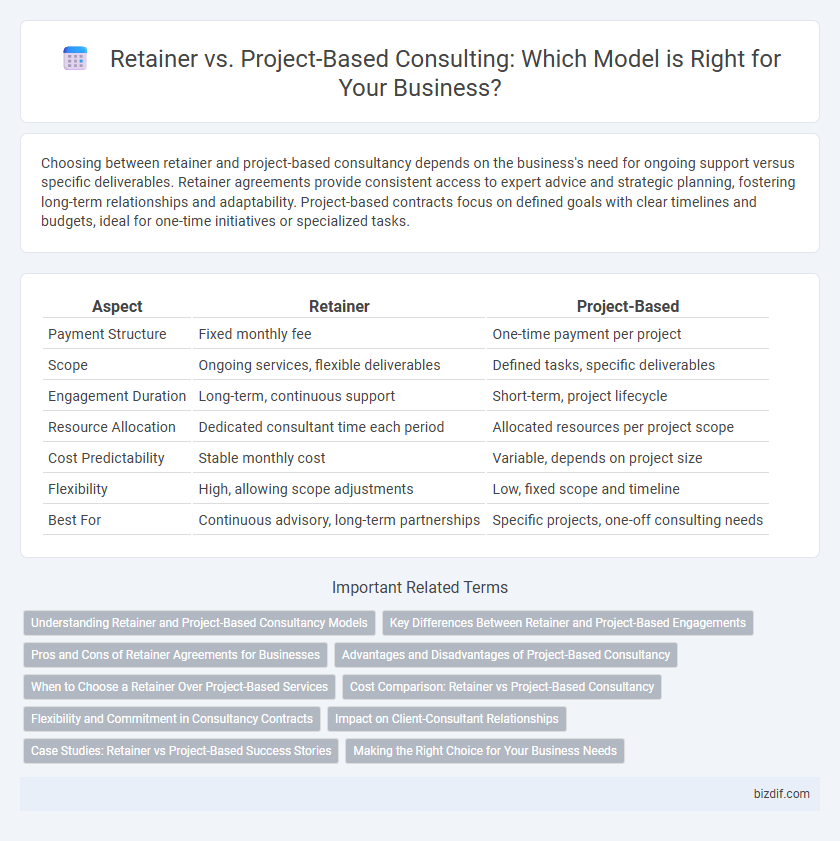Choosing between retainer and project-based consultancy depends on the business's need for ongoing support versus specific deliverables. Retainer agreements provide consistent access to expert advice and strategic planning, fostering long-term relationships and adaptability. Project-based contracts focus on defined goals with clear timelines and budgets, ideal for one-time initiatives or specialized tasks.
Table of Comparison
| Aspect | Retainer | Project-Based |
|---|---|---|
| Payment Structure | Fixed monthly fee | One-time payment per project |
| Scope | Ongoing services, flexible deliverables | Defined tasks, specific deliverables |
| Engagement Duration | Long-term, continuous support | Short-term, project lifecycle |
| Resource Allocation | Dedicated consultant time each period | Allocated resources per project scope |
| Cost Predictability | Stable monthly cost | Variable, depends on project size |
| Flexibility | High, allowing scope adjustments | Low, fixed scope and timeline |
| Best For | Continuous advisory, long-term partnerships | Specific projects, one-off consulting needs |
Understanding Retainer and Project-Based Consultancy Models
Retainer consultancy models involve ongoing support with a fixed monthly fee, ensuring consistent access to expert advice and strategic guidance. Project-based consultancy models focus on specific deliverables within a defined timeframe and budget, ideal for businesses with clear, short-term goals. Choosing between these models depends on the client's need for continuous collaboration versus targeted, one-off expertise.
Key Differences Between Retainer and Project-Based Engagements
Retainer engagements involve ongoing advisory services with a fixed monthly fee, ensuring continuous support and prioritization, while project-based engagements are defined by specific deliverables and timelines with payment upon completion. Retainers provide flexibility for evolving needs, accommodating unforeseen challenges, whereas project-based contracts emphasize clear scope, budget, and deadlines for discrete tasks. Understanding these distinctions helps businesses choose between sustained strategic partnership or focused, outcome-driven consultancy work.
Pros and Cons of Retainer Agreements for Businesses
Retainer agreements provide businesses with consistent access to consultancy services, ensuring ongoing support and priority response times which enhance project continuity and long-term strategic planning. However, the fixed monthly fees may lead to underutilization or unnecessary expenses if workload varies significantly, potentially impacting budget flexibility. Retainers promote stronger client-consultant relationships but require clear scope definition to avoid scope creep and ensure measurable deliverables.
Advantages and Disadvantages of Project-Based Consultancy
Project-based consultancy offers clear scope and fixed costs, allowing clients to budget precisely and measure deliverables against specific objectives, which enhances accountability and timeline adherence. However, it may lack flexibility to accommodate evolving business needs or unexpected challenges, potentially leading to scope creep or rushed outcomes. The finite engagement structure can limit ongoing strategic input, reducing long-term value compared to retainer agreements.
When to Choose a Retainer Over Project-Based Services
Retainer agreements offer continuous support and strategic guidance, ideal for businesses requiring ongoing expertise and flexible resource allocation. Opt for retainer-based services when consistent collaboration, rapid response times, and long-term relationship building are critical to project success. This model reduces administrative overhead and ensures priority access to consultants compared to project-based contracts with fixed scopes and timelines.
Cost Comparison: Retainer vs Project-Based Consultancy
Retainer consultancy offers predictable monthly costs, making budgeting easier with steady cash flow management, while project-based consultancy often involves higher upfront expenses and variable pricing that fluctuates by project scope and duration. Retainer fees typically cover ongoing services and strategic support, promoting long-term partnership value, whereas project-based costs are one-time, linked to specific deliverables without continued service assurance. Businesses prioritizing cost stability often prefer retainers, while clients with isolated projects or limited budgets may opt for project-based consultancy to control expense spikes.
Flexibility and Commitment in Consultancy Contracts
Retainer agreements in consultancy offer ongoing flexibility, allowing clients to access expert services as needed with a consistent monthly commitment, ideal for long-term strategic support. Project-based contracts deliver clear deliverables within a fixed timeframe and budget, emphasizing defined scopes and limited flexibility once the project begins. Choosing between retainer and project-based models depends on a client's need for adaptable consulting resources versus one-time, goal-specific engagement.
Impact on Client-Consultant Relationships
Retainer agreements foster long-term partnerships by ensuring consistent support and deeper understanding of client needs, leading to tailored strategies and proactive problem-solving. Project-based contracts, while offering clear deliverables and defined timelines, often limit ongoing collaboration and knowledge transfer, potentially reducing adaptability to evolving business challenges. Choosing between retainer and project-based models significantly influences trust, communication frequency, and overall effectiveness in achieving client goals.
Case Studies: Retainer vs Project-Based Success Stories
Case studies reveal that retainer agreements often yield sustained client-consultant relationships, enabling ongoing strategy refinement and faster issue resolution, as seen with Fortune 500 companies increasing ROI by 30% over six months. Project-based engagements highlight clear deliverables and budget control, exemplified by startups successfully launching products within three months and under budget. Comparative analyses demonstrate retainer models drive long-term growth, while project-based consulting excels in one-time, targeted initiatives.
Making the Right Choice for Your Business Needs
Choosing between retainer and project-based consultancy hinges on your business's need for ongoing support versus specific deliverables. Retainer models offer continuous access to expert advice, ideal for long-term strategy development and adaptive problem solving. Project-based engagements focus on defined outcomes within a set timeframe, providing cost predictability and clarity for targeted initiatives.
Retainer vs Project-Based Infographic

 bizdif.com
bizdif.com